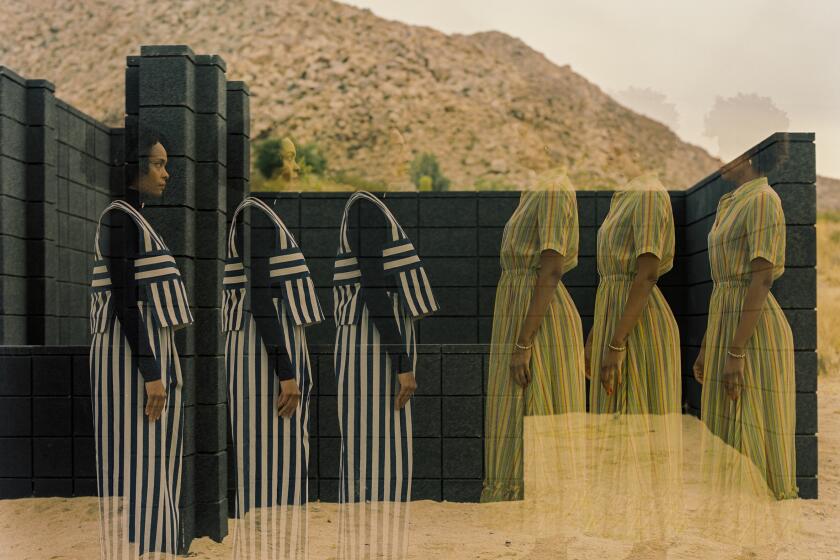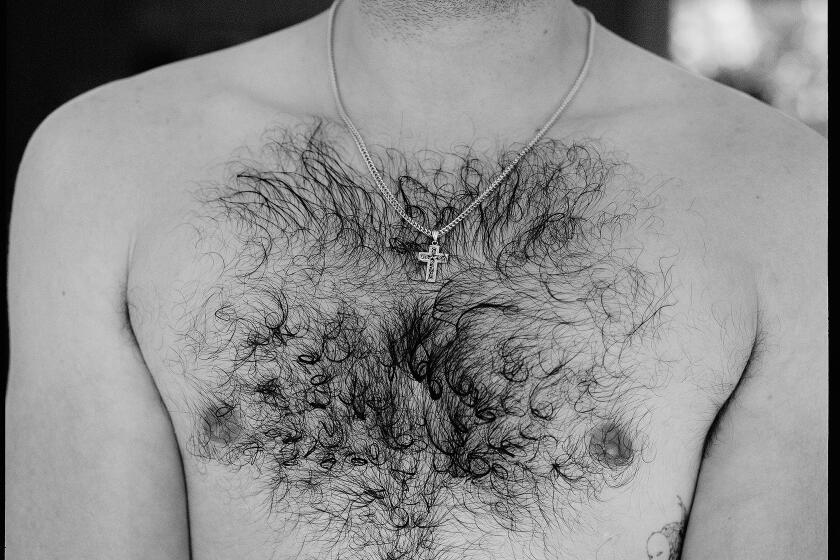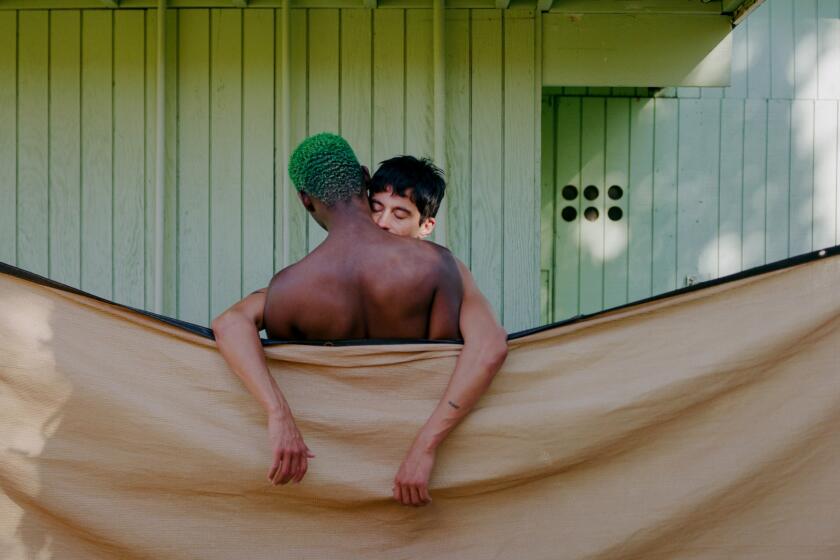- Share via

This story is part of Image issue 8, “Deserted,” a supercharged experience of becoming and spiritual renewal. Enjoy the trip! (Wink, wink.) See the full package here.
Renewal looks like a 200-acre piece of land off Twentynine Palms Highway: a compound built in the image of its surroundings. The Joshua Tree Retreat Center, home to the Institute of Mentalphysics, was constructed by Frank Lloyd Wright’s son Lloyd Wright in the 1940s under the guidance of the institute’s founder, Edwin J. Dingle, a spiritualist and breathwork expert known to his students as Ding Le Mei. Dingle chose the location because it sat on 19 vortices, believed to be powerful, swirling energy centers in the Earth. The structures were built using sacred geometry and organic architecture. It was an ideal setting for teaching a practice like Mentalphysics — which promised a new way of thinking through “an experiential method of self-realization that teaches the oneness of life embodied in all substance, energy and thought.” In other words: a new you, ushered in by the desert.
The desert is where people search for transcendence. In a land of extremes, personal transformation doesn’t seem so out of the question. The Joshua Tree Retreat Center is just one site people visit, hoping to deepen their spiritual practice through group retreats and personal retreats held on the grounds. The desert is littered with other points of departure too: Indio, home of Coachella; Palm Springs; the high desert. People make the two-hour drive east of L.A. to shed unwanted skin, to kill old versions of themselves completely and emerge born again. “Historically, in a lot of religions too, you’ll read about spending time in the desert,” says Terry Taylor-Castillo, executive director of Joshua Tree Retreat Center. “Some people feel the desert is just wasteland, but it’s just the opposite — especially where it concerns spiritual reflection and taking a break.”
Close your eyes in a place like Joshua Tree, especially at night, and you might wonder if you’re in space. Open them again, and you might feel like you’re on Mars. It gets eerily quiet in the desert — quiet enough that “you can hear your blood going through your body,” Taylor-Castillo says. The blistering sun baptizes during the day; the infinite dust dries you out in the afternoon; the wind bites at night. People visit to become one with the elements, but they’re not just moved to the desert for nature. They want to become one with themselves.
Inside issue 8: ‘Deserted’
Kenturah Davis and Alice Smith have a supercharged self-care retreat.
Sophia Nahli Allison shows you what’s possible when you allow yourself to be led by spirit.
Justin Torres remembers those visits to the clothing-optional hotels in Palm Springs.
Dave Schilling gets to the bottom of why chest hair is the desert’s No. 1 accessory of choice.
It’s no secret that people do psychedelic drugs in the desert. Now, it seems, everyone has caught the wave. You probably either know someone who’s tripped there or have fallen down an internet rabbit hole and seen the experience unfold on your screen. The Google search “psychedelics and Joshua Tree” yields YouTube vlogs, confessionals and Reddit threads. One essay, posted to Medium by the writer Faye Lessler, is headlined: “I Took Magic Mushrooms in Joshua Tree National Park and Discovered the Meaning of Life.” In a documentary short found on Vimeo, called “Joshua Tree,” director Sean Dunne captures a mother and daughter on their first shroom trip together in the desert. At one point during the trip, the mother goes for a walk with her dog. She looks out into the distance, up at the rock formations in front of her, and marvels at them for a long time. She studies how they connect, noting that two rocks in the distance look like they’re kissing. “Imagine all that just happening,” she says, in awe. “All those boulders coming together.”
In the myriad ways people choose to lose, then find themselves in the desert — music festivals, desert raves, spiritual retreats — the setting is essential to the experience. The desert is where “Insecure’s” Issa, Molly and Kelli take edibles and MDMA and finally have to face themselves (that was the low desert, in Coachella Valley). Nowadays, many Airbnb rentals seem to be specifically designed for otherworldly experiences — solar-powered dome houses and modern desert bungalows with outdoor showers meant for gazing at the stars. “When somebody arrives here, I feel like half the work is done by the beauty and the mysticism of the location,” says Cynthia Morgan, who opened the world’s first hypnotherapy-based retreat, Desert Reset, in Joshua Tree in 2017 after closing her private practice in L.A. “I then just have to guide them even deeper. In order to heal, you have to hear your inner self, and in order to do that, you need silence. The desert provides that more to me than anywhere.”
In 2017, Elizabeth Xu and her friend rented an Airbnb in Joshua Tree called the Color Trip Trailer with the intention of doing acid for the first time there. The dwelling is drenched in fluorescent shades of neon, with shag rugs and string lights, and sits right across from the national park. “It was just the energy there,” Xu says. “Feeling safe because there’s no one around you. You’re in the desert. I knew to surrender to it. I remember laying on these lawn chairs that were super low to the ground. I was looking up at the sky, and something just said, as I was starting my trip, ‘Everything is OK. You can breathe again.’”
There’s no shortage of experiences like this that piggyback off the lure and mystery that draw people to the desert in the first place and attempt to make them tangible. For years, there have been communities harnessing the power of the desert in a more DIY, underground spirit, forging their own kind of meaning in the process. Church takes shape almost every weekend in the form of desert raves, renegade gatherings that center around dance music and last anywhere from one night to multiple days. The setting is a convergence of all the ways people try to become new again in the desert: music, spirituality, drugs. “It’s so specific,” says Vanessa Hickman, a native of Antelope Valley and a fire spinner, an art form she picked up at these small desert parties. “Your first initial experience, it’s like you’re a kid in a candy store. It’s the best place to be on Earth. Everyone gets you. You can be free.
“It’s this big empty lot of dirt and mountains, depending which location you’re at. And then you get all these people dressed up in different costumes. You see fire spinners, and you get so mesmerized by the beauty of everything happening all at once. Something about being out in the open wilderness, especially on the dirt, grounded, it feels like home. And then you take drugs, and it’s just times 10. Like: I am everything, everything’s connected.”
🍄🍄🍄
Somewhere on the internet exists a picture of me at 20 years old during my first trip to Joshua Tree. In it, I’m laying in my rental for the night: a tiny one-room dome made of adobe, filled with a mattress and pillows. The next morning, I got up early and drove through the national park until I found the biggest boulder I could climb. It was one of those rare days that’s both sunny and cold at the same time, where your cheeks are kissed by the sun and your nose is chapped by the wind. I lay on that boulder with my back flat and my knees up to the sky, hands crossed along my lower abdomen. I might have been there for minutes, it might have been hours — the illusion of time dissolves quickly when you’re surrounded by what seems like infinity.

Buy a copy of Deserted: A journey to the end of the world
Image issue 8 is a supercharged experience like no other. This isn’t your average trip to Joshua Tree, Palm Springs or the Mojave. It’s a journey to the end of the world.
Shop the L.A. Times Store 🌵
The desert envelopes you in a silence so big that it forces you to actually hear your inner voice. The noise of traffic, the distractions of your job, the relationships that never felt quite right: None of these things exist there. What’s left is everything you’ve suppressed — all those nagging feelings you’ve been able to drown. The desert mirrors them back to you, turns them up so loud that you can’t pretend anymore. Something beautiful happens in that moment of reckoning: You have the freedom to feel.
I listened, and listened, and heard nothing for miles. Then, there it was: me, for what felt like the first time. That’s when I understood. Renewal is just getting back in touch with yourself.











